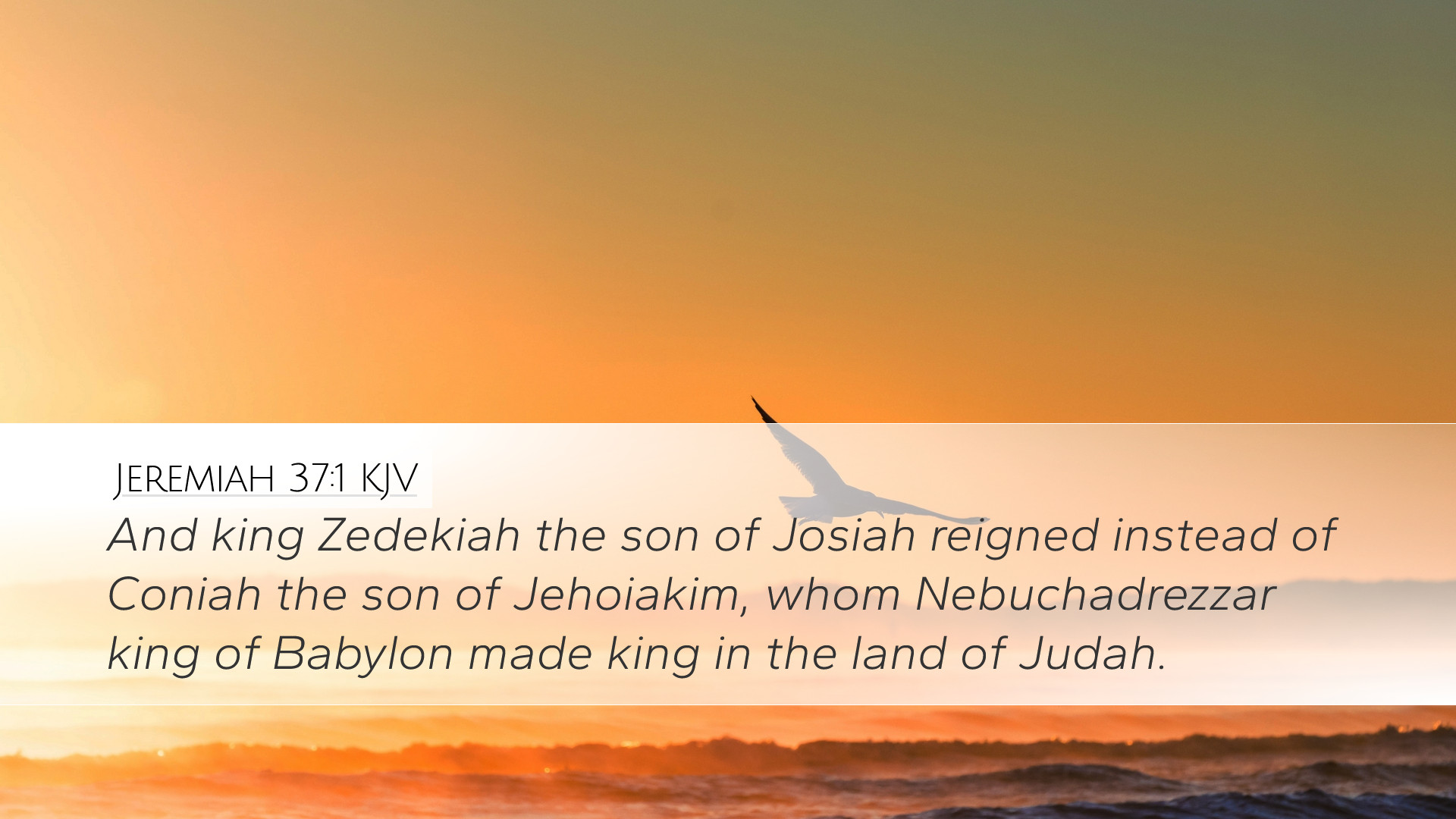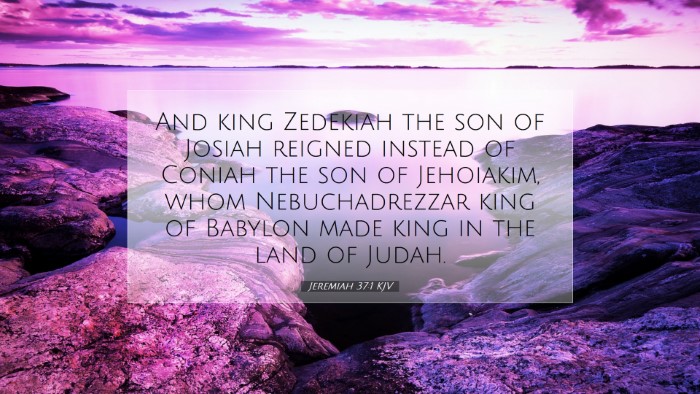Commentary on Jeremiah 37:1
Jeremiah 37:1 states: "And King Zedekiah the son of Josiah reigned instead of Coniah the son of Jehoiakim, who was made king by Nebuchadnezzar king of Babylon."
Contextual Background
This verse introduces a pivotal moment in the historical narrative of Judah during a time of great upheaval and prophecy. It marks the reign of Zedekiah, who was appointed by Nebuchadnezzar after the fall of Jerusalem, and his struggle against Babylonian authority.
Insights from Public Domain Commentaries
Matthew Henry’s Commentary
Matthew Henry emphasizes the theological significance of Zedekiah’s reign, noting that it represents the shifting sands of human power under God's sovereign hand. He states that Zedekiah's position as king, though established by Nebuchadnezzar, ultimately serves as a reminder of the futility of rebellion against divine will.
- Divine Authority: Henry points out that even kings are under God’s jurisdiction, and the appointment of Zedekiah reflects God's providence.
- Human Frailty: The commentary underscores Zedekiah's weaknesses and indecision, illustrating the tumultuous relationship between earthly rulers and their reliance on God.
- Historical Consequence: The context of Zedekiah’s rule serves to foretell the impending judgment upon Jerusalem as the people are encouraged to seek God’s guidance.
Albert Barnes’ Notes on the Bible
Albert Barnes provides a detailed analysis of the political landscape during Zedekiah’s ascendance to kingship. He identifies Coniah (Jeconiah) as a preceding king whose deposition was a direct consequence of his failure. Zedekiah’s kingship is thus framed as a divine response to the sins of Judah.
- Change in Leadership: Barnes discusses the implications of leadership transitions, noting that Zedekiah, being restrained by Babylon, illustrates the limitations imposed upon rulers who do not adhere to divine principles.
- God’s Sovereignty: He connects this change of kings to God’s overarching sovereignty, emphasizing that God uses foreign powers to accomplish His purposes.
- Judah’s Unfaithfulness: The commentary draws attention to the persistent disobedience of the people of Judah, setting the stage for the prophetic messages delivered by Jeremiah.
Adam Clarke's Commentary
Adam Clarke provides a thorough exploration of Zedekiah’s personal character and decisions during his reign. He presents a stark contrast between Zedekiah and his predecessors, illustrating how fear and indecision marked his leadership.
- Character Analysis: Clarke describes Zedekiah as a man torn between loyalty to God and fear of Babylon, indicating a spiritual crisis within the leadership of Judah.
- Prophetic Insight: Clark mentions that Jeremiah’s counsel to Zedekiah serves as a critical theme, wherein the king’s failure to heed God’s warnings leads to dire consequences.
- Significance of His Name: The name Zedekiah, meaning "the Lord is righteous," serves as a divine irony, challenging him to live up to his given name.
Theological Reflections
The narrative surrounding Jeremiah 37:1 offers profound theological insights that resonate with contemporary applications for pastors and theologians today.
Human Authority and Divine Sovereignty
One primary lesson from this verse is the interplay of human authority and divine sovereignty. Zedekiah’s rise, despite being under Babylonian control, reminds believers that God is ultimately in charge of history and governance. This speaks volumes about trusting God in leadership roles and societal structures.
The Weight of Leadership
In every age, the responsibilities of leaders carry significant weight. For pastors and church leaders, the call to seek God and lead righteously is underscored in the narrative. Zedekiah's failure reminds modern leaders of the importance of making decisions rooted in faith rather than fear.
Call to Repentance
Jeremiah's message to Zedekiah is also a reflection of the perpetual call to repentance. The context urges pastors and congregants alike to consistently examine their spiritual walk and the corporate integrity of the church towards God’s standards.
Conclusion
Jeremiah 37:1 serves as a rich foundation for theological reflection and practical application, highlighting themes of authority, accountability, and the enduring call to obedience to God's will. The insights from these public domain commentaries provide profound wisdom for anyone engaged in the study and teaching of Scripture.


